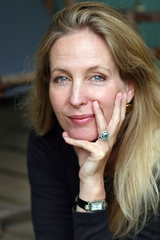A guest post from Bloomsbury author Katie Hickman.

When I first started writing I used to think that there was nothing in the world quite as intimidating as a blank sheet of paper. A thought I was reminded of only a few days ago when staring at one myself, waiting for the inspiration to begin my new novel, the next in the series after The Pindar Diamond.
There is something about it that always seems - well, so improbable somehow.
It always feels as though there’s something else I should be doing. Some sort of preparation: reading, researching, dancing round a maypole, perhaps? It’s the reason that writers’ houses are always supposed to be so terribly clean. We are forever putting off the evil moment.
It’s hard beginning any book, but novels are particularly difficult. Before you start it, a novel is something that does not yet exist. It is – what? A thought. A feeling. A castle in the air. In my own case, a ghostly presence (the character of John Carew) who has been stalking me for the last 15 years, damn him, wanting his moment in the sun.
Here are a few strategies that I’ve tried over the years. If beginning at the very beginning seems too daunting, I try writing small fragments (a description of a character or a place, or a piece of dialogue) which might end up at any point in the novel.
On Monday I started by writing a scene that I’ve had in my head for many months now. It’s rural England, 1606. Sometime towards a winter nightfall. A man in ragged clothes is making his way down an ancient drover’s path. Who is he? Where has he come from? Where’s he heading?
At first, it’s all horribly creaky, but I spend all Monday and Tuesday fleshing out a description of the man and the drover’s path (it helps that I have a real location in mind), and by Wednesday, suddenly, things are beginning to happen.
Everything I’ve been doing this week begins to feed into that one scene. I think of the photographic portraits I went to see at a friend’s exhibition on Bankside (Tessa Traeger: Voices of the Vivrais) and somehow they insinuate their way into my description of the man - who then mysteriously becomes two men.
My mystery man now has a companion, some sort of... well, he looks like a vagabond, or a country type that used to be called a ‘moocher’. Who is he? What’s he doing there? And where is he going?
(Want to know more? I will be writing a detailed, almost daily description of the process of writing this new novel in my blog.)
So: how do you begin a new novel?
Firstly, don’t wait for inspiration. Inspiration comes during the actual process of writing, not while you’re waiting to begin.
Instead: put a date in your diary. Sit down. Start writing.
For more on Katie Hickman see her Bloomsbury Publishing page and her official website.
That is good advice. I have a notebook full of phrases, parts of conversations, scene descriptions that I hope to use in future novels. For my first (so far unpublished) attempt my method was to write up the bare bones of the story and then after much editing and revising I flushed it out adding the descriptions, harder dialogues and other 'extras'. It was a long hard process though so perhaps I'll try Kate's method for novel 2.
Hello Katie, great advice, though I don't think I’m at that stage anymore. I do find difficulties, but in my case, it's not for lack of inspiration. I know in my lifetime I'll never get to write all my ideas. So what I do is choose what I believe is more important or seemingly relevant and see where it leads. Development comes with time and I find that to be the most difficult thing, as time seems to always be in short supply. Sometimes it seems like I'm not writing nearly enough. After all, life and family comes first and writing is what I get to do in my 'spare time' (when everyone is asleep). I did finish the first draft of my nonfiction and last week the first draft of my fiction. Mulling them over, I got an idea that if I combined the two, it would be even better. I know it will be a pain and I had no idea this was what I would end up doing, but I will, for there will be something special created if I succeed. So, in a way I'm glad to advance to the next step but in another it feels like I'm starting from scratch to create a new book with the same ideas and I've just wasted time. Ever felt like that?
Good luck at the conference tomorrow.
Xean
6/6/18/2010